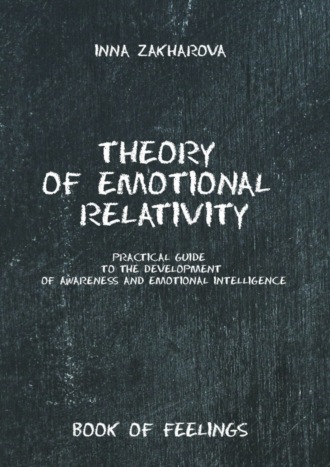
Полная версия
Theory of emotional relativity. Practical guide to the development of awareness and emotional intelligence
If partners in such relationships are perceived, able to agree, they can say all the moments of interaction aloud and strengthen each other. To do this, we must share the responsibility: “I’ll do this, you’re doing that, I’m free at this time.” You need to say everything. If you arm yourself with this honesty and clarity in relationships, everything becomes cool. But if a person is not conscious, he is not ready for sincerity, because it is very unsafe. In the pattern, a person with a need for security lives a little bit secretly, just in case there should be workarounds: “I’m kind of with you, but I have hidden the waste routes. “I have 5 rubles, and I don’t tell you that there are 10 more in the back pocket”. There is always a desire to protect yourself even more.
There are three main strategies to satisfy the needs for security. As the strategies differ, values also may be different.
Strategies of getting values:
• In order to feel security and self-confidence, a person stocks up with the support of others. “I want to be friendly with everyone, I want to answer expectations of others so that I can count on reciprocal support and be in an environment that is well disposed towards me.” In this case, support will be a high priority value. Get support.
• . In order to feel security and self-confidence, a person tries to the maximum to not get involved in any relationships, so that others do not have any expectations of him. In this case, we are talking about the high priority of the value of freedom. “My safety is in my freedom, in the decline of responsibility for other people. I want no one to have any expectations about me. Let me not have support, it doesn’t matter. I can provide for myself, take care of myself, I can manage it. The main thing is that people around me do not press me and do not expect anything of me.” Do not get involved
• To feel security and self-confidence, a person constantly learns, reads, studies, watches popular YouTube channels, reads news sites, loads his mind with various kinds of information. “If I know, I’m safe. I’m prepared for any situation, I know a lot and can maintain a conversation on any topic using specific linguistics, give the impression that I understand the subject (even if not very deep and in theory).” Information is a high priority value. Get information.
One is calling to the other:– Hi! What are you doing?
Love. Strategies and Values
What is valuable when the need for love is important right now? This is what will bring to life the attention and acceptance of other people – relationships, close ties, sincere interest, compliments, praise, a sense of personal worth and uniqueness.
If I need love (this is a need), I want close relationships, so I need to find an exceptional person for such relationships. To achieve this, I need to attract him (even if we are not talking about relationships in a couple, but about a group of interesting people, which I want to belong to). What do we do to get attention? We are starting to decorate ourselves, we want to look in some interesting, attractive way, to fit into society, to please some specific people. We can decorate ourselves in different ways: through the appearance or through creativity we can express our inner world. Both these things in this case become values for satisfaction of need for love.
Values from the need for love and acceptance:
• . It is important to find the very one person among a million others who will become the most important for me, to whom I can discover something very sincere, secret. Intimacy here also means. In close relationships, we can touch each other, hug, kiss. Sex is the ultimate closeness of man and woman. A strong desire for intimacy often leads to complete loss, to the loss of a sense of own boundaries. Close relations
• Feelings are a criterion of intimacy, so they are also very important if the need for love is significant. Of course, it is more preferable to have such feelings as tenderness, desire, joy, but if we do not have such feelings, so at least it is better to have any rather than to have nothing. Indifference means a lack of communication, a lack of love, so people with a leading need for love provoke a partner to show vivid and bright emotions, they can get hysterical in order to knock out at least some kind of emotions. Feelings.
• Usually people with a leading need for love are very creative. Creativity is an opportunity to express your inner world and present it to others to receive attention, recognition, praise, understanding, emotional reaction, etc. Criticism or indifference to creative products is experienced very painfully, as it is perceived personally “If they didn’t like my poem, they didn’t like me.” Self-expression.
• . As love is a feeling of exclusivity in the lives of other people, individuality becomes a high order value for people with a leading need for love. “In order to be loved, I need to be special, have my own distinction, uniqueness, and be different from millions of other people. Having a bright personality, I will have more chances to get love.” However, in this quest for individuality, a person can fall into another trap. Love implies a feeling of unity, similarity and individuality emphasizes the difference. Therefore, an imbalance in favor of individuality leads to a feeling of loneliness: “I am different, different, there are no more such people”. Personality
• Sincerity is another criterion of intimacy. If we are close people, we should know everything about each other, we can and should share sincerely all our thoughts and feelings, talk about all events in our life. It also has some traps. A strong desire to get love often makes you talk about yourself only pleasant things, it is essentially a lie or not complete sincerity, which creates an internal conflict: “Sincerity is very important to me, but I’m afraid to lose your love, so I embellish myself.” Sincerity.
What strategies do people use to get values and satisfy their need for love?
Strategies for getting love:
• In order to feel love and connection with others, a person constantly pays attention to the object of his sympathy, fits into his problems and tasks with some help, constantly strives to be near. “I want to be so necessary and useful to you that you cannot live without me.” Such behavior greatly stresses the other person with the amount of help, attention and love that is given to him. In this behavior, values of the highest order are closeness and dependence. Deserve love.
• To feel love and connection with others, a person demonstrates his uniqueness, beauty, weakness and vulnerability in order to attract his “parent”, who will fulfill all desires, because the parent must take care of his “tender flower”. Such a person constantly requires attention: “Put on all your matters, devote all your time to me, do something good for me.” This behavior of a capricious needy child aggravates a loved one. Such a strategy is often based on the manipulation of resentment. Here the values of the highest order will be individuality, feelings, beauty, creativity. I am a delicate flower.
• . To feel love and connection with others, a person works hard on himself to build a smart shape that everyone will like. This strategy of getting love is built on high activity, productivity and the pursuit of status. The standard is the generally accepted current understanding of success, and all activities are aimed at achieving the status of “smart”. The guarantor of attracting love is all sorts of success attributes – brands, positions, achievements. Here the highest order values are fashion, style, image, attention, admiration. Buy love
• . This is a clever variant. In order to feel love and connection with others, I doom myself to loneliness. “I need love and acceptance so much that I can imagine in advance how much I will suffer when I lose love. Not to experience this suffering, I abandon relationships and love in advance”. In such cases, a person can be a recluse, a hermit, however, creativity will fill his life, although “for the desk drawer.” Here values of the highest order will be creativity, self-expression, individuality, feelings, beauty. Avoid pain
Respect. Strategies and Values
What values are the most significant, when we speak about respect and self-respect?
Values from the need for respect:
• Self-esteem is directly related to self-respect. “I could. I managed, although it was hard, but others could not do it at all.” If we can say this, it allows us to be proud of ourselves, to respect ourselves and those others whom we can think about in this way. Power.
• Autonomy. Autonomy is a criterion of strength, because if you can cope without outside help, you are strong enough. Autonomy and independence also allow you to feel clearly your boundaries, this is necessary for self-respect.
• Power is also a criterion of strength. “I am so strong that I can influence the situation of other people. Everything happens according to my will.” Power.
• Despite the fact that we all try to avoid it, the struggle is a circumstance in which we can show our strength and, therefore, satisfy the need for respect. Struggle is a proof that the strong can fight and defeat circumstances and other people. Struggle.
• . Achievements are victories that we record on our own account. “I am strong, my achievements are a real demonstration.” Achievements
• Professionalism is a tool for achievement. “I am a professional in my field. Significantly, my opinion is authoritative, they will listen to it and respect me.” Professionalism.
• Responsibility determines the degree of influence. “If the influence on the situation is in my hands, then I’m the main one. I will decide what, how and when to do, while I am ready to be responsible for any consequences.” Responsibility.
Strategies of getting values:
• To feel his worth and respect for himself, a person directs all his resources to ensure that one of his species says that he is a big person and that he needs to be obeyed. A loud, assertive voice, a heavy look and wisecracks help him to get respect. “I’m the boss, and just try to argue with that.” Here the value of the highest order will be power, authority and struggle. In relationships, other people feel aggression, often perceive a person as a tyrant. Seize the power.
• To feel his worth and respect for himself, a person depreciates his importance as much as possible himself: “This is garbage, I do not need any respect. Well, they take my things, well, OK. They didn’t listen to my opinion, well, they just didn’t hear it. This is unimportant for me. My opinion is not important.” Your opinion is depreciated on your own in order not to worry painfully when someone else does it. Such a person often chooses a lifestyle in which communication with people is minimal, life is organized away from others so that no one can insult, offend or devalue. This is a strategy of escaping from oneself, from one’s needs. Here, the highest order values are autonomy, non-interference. Depreciate a need.
• . To feel his worth and respect for himself, a person strives to be a perfectionist, to be a super-professional in some narrow field. So that no one would even have the thought that such a person cannot be respected. “I will be irreproachable and people will be forced to respect me”. By definition, it is impossible not to respect him, because he only does what works. He works more than others, everything is fine, if you turn to such a person, he will always do everything clearly and on time. Everyone respects such a pronounced professionalism, even those who do not like him: “I do not like this person, I will not communicate with him. But he is worth respecting him.” For a person with such a strategy of behavior, the highest values are professionalism, principles, rules, discipline. Earn respect
Values and Anti-values
– this is exactly the opposite of values. If support is a value to me, then pressure will be an anti-value. Attention is a value, ignoring is an anti-value, strength – weakness. Anti-values
Sometimes we find ourselves in conditions that create even more urgency in need. It is as if you want to drink and get into a dessert, where there is not even a shadow nearby, then you want to drink even more.
It also happens with psychological needs. For example, you need some attention from a person or a group of people, and instead you get complete disregard. Or you want praise, approval in order to feel your value, for this you do some work, and in return you get criticism. It turns out that in addition to the fact that you did not satisfy your need for love, you also got a greater deficit in this need.
For example, the anti-value of security is “uselessness” and “waste of time.” We are talking about situations where you, moreover, do not get the resource you were counting on, but also lose what you had. A common case: you go to an event to get a resource, for example, a weighty opinion or some new information, and when you come, you do not receive an authoritative opinion or useful information, but you spend money and your time (money and time are values from the need for security). As a result, you got “uselessness” and “a waste of time and money”, you feel no more relaxed as planned, but more anxious – the need for security has become even more urgent because you have just lost your resources.
“Weakness”, “inability to influence,” “helplessness” are examples of the anti-values of the need for respect. Usually we meet with them when life circumstances are irreversible or the opponent is much stronger than us.
What do we feel at the thought of a possible encounter with anti-values? Disgust. We do not want to meet our anti-values, we want to maximize the distance from them. For example, if you have a leading need for security and you have to communicate with a person whose level of knowledge is much lower than yours, most likely you will experience arrogance, which includes disgust. When information is very valuable to you (informed means warned), and a person cannot be its source, you feel a security risk because you are wasting time, instead of this conversation you could be at home and read a book, such time would be of great benefit for you.
This is called a . It can be inside one person or in the relationship of people. In such cases, we say: “I don’t understand how you can live like that!” values conflict
That is why we want to have close people with whom we’ll have common values from a high priority list, everything else is not so important, there is always the opportunity to come to an agreement. When something very important does not coincide, when it is a value for one partner, and it is anti-value for the other one, it is impossible to go through disgust that arises, it will be so strong and create such a great distance that you can’t even start a relationship with this person.
For example, one person has a need for respect, and values of autonomy, independence are at a high level of priority, while the other one has a leading need for love, and communication, closeness is very important for him. If you don’t realize these differences and do not control your feelings, then the following situation may arise: when one strives for greater intimacy, the other will move away due to the feeling that his boundaries are violated and he loses autonomy. One calls the other 5 times a day, wanting to be closer, to be initiated into all the circumstances of the other’s life, and the other gets angry every time, because it looks completely different for him. It seems he is controlled by your partner and has to report about your working day every time, which means that he is losing his independence.
When we face anti-values, we have not only disgust, but also other emotions. If we are talking about the need for security, when we meet the anti-values of this need (lack of money, a situation of uncertainty, pressure, any direct danger), always arises sharply. When we face anti-values of the need for love (ignoring, criticizing, condemning, humiliating), we feel . When faced anti-values of the need for respect (injustice, lack of obligation, weakness, lies, evasion, irresponsibility) a strong arises. fear shame anger
When the situation of meeting with anti-values has passed, we experience sadness or feelings that contain sorrow (resentment, guilt). It is explained by the fact that we did not get what we needed, besides we created a deficit for ourselves, made your own life even worse than it was. When we face any anti-values (pressure, ignoring, injustice, etc.), there is always the temptation to relieve ourselves of responsibility for what has happened and shift it to another person or to the situation as a whole. However, the sadness that inevitably arises in such cases always tells us: “Something, that YOU’ve done, haven’t led you to the result, you haven’t received or even lost your value”. A good understanding of yourself will be that you’ll understand what exactly valuable you wanted to get.
For example, you wrote an article and received a critical statement towards it: “It is dull, there is nothing in it that would attract the attention of the reader”. This criticism deeply hurt your heart. At the moment of this criticism, you are likely to feel shame (awkwardness), and then sadness (in its purest form or as part of resentment, guilt). What makes you so sad? What didn’t you get or lose? This is a question that needs to be answered within yourself. In this example, we are talking about a person with a leading need for attention. When such a person expresses himself creatively (writes an article), he is subconsciously motivated by the satisfaction of psychological needs – to receive praise, admiration, attention. But in the end, instead of them, he receives criticism that deprives the remnants of self-love. It hurts. Realizing such things, you should rethink your motivation and set a conscious goal for writing an article. For not just getting praise as a result of writing an article, but for expressing in it what is really important to you. And then you will get satisfaction from your work, and it won’t be important to you how it will be met by others. Thus, self-respect appears and when you find it, self-love will also become greater.
Some things can be a real value for one personand an anti-value for another one!Three Types of Joy
1. Calmness
When we meet the values that relate to the need for security (support, knowledge, financial resources), we feel joy, it seems to confirm: “You do everything right, go ahead, do it again.” If it comes to security, then joy will be in the form of calm, lightness, relaxation. When you are in your fortress, there are people around who will support you, you know and possess information, there is enough money in your account – you are calm.
2. Pleasure
When we meet with values relating to the need for love (intimacy, communication, compliments, attractive appearance), we will also feel joy, but in this case it will be in the form of pleasure, enjoyment. When you look at a picture that you like, you feel pleasure, when you communicate with a person who you like, you feel enjoyment.
3. Satisfaction
When meeting with values that relate to the need for respect (strength, justice, integrity, honesty, responsibility), we feel joy in the form of satisfaction. When you see your cool results that required commitment, you feel deep satisfaction from the work done.
Let’s look at the table and find out what a person with the leading need for security wants to be eager for and what he wants to get rid of.
Security
According to the list in the table, you can notice a values conflict, for example, stability and diversity, or care and freedom. Any diversity implies changes, except in situations when you, having diversity, choose the same. Care, however, implies a connection, and therefore, dependence on another person, and in this case, there can be no talk of complete freedom. There are special relationships with value rules. They are very necessary in order to understand how others should and will act, but I don’t want to act according to the rules myself, as this means a lack of choice and diversity, which are also values. When there are no rules, it’s also bad – chaos (anti-value) arises, you don’t know from whom and what to expect. It turns out that such people need rules and clear instructions, but they themselves violate them.
It turns out that a person with a leading need for security is often very controversial and indecisive, constantly doubting.
The list of values of a person with a leading need for love, acceptance, attention is given in the table below. There are practically no contradictions inside this table. With the exception of and , often the image involves a certain embellished look. It turns out that a person with a leading need for love highly values sincerity, but does not want to show himself real. sincerity image
Love
The third basic psychological need is respect. The values of a person with a leading need for respect are practically the opposite of the values of the need for love.
Respect
There are also practically no conflicts in this list, with the exception of a couple of . As justice is always subjective and is determined basically by systemic rules, it happens that, in an effort to restore justice, people with a leading need for respect are often not fair according to other people. justice and injustice
Let’s remember that all three needs are important for each of us, and look at all three tables with values. You may notice multiple conflicts. For example, autonomy satisfies the need for respect, but denies communication, which is very valuable for satisfying the need for love. And the availability of options, which is so important for satisfying the need for security, means evasion and unwillingness to make decisions that do not satisfy the need for respect. Only a good understanding of yourself, clear internal priorities and conscious goals allow you to resolve these internal conflicts and find the necessary balance among your needs. There are possible value conflicts in the table below. Columns indicate needs, and rows indicate conflicts.
It turns out that we are all constantly in a state of internal conflict. To resolve this conflict, we need emotional competence. Only emotions can show us the truth about ourselves if we learn to hear and understand them.
Security + value = calmnessAcceptance, attention + value = pleasureRespect +value = satisfaction
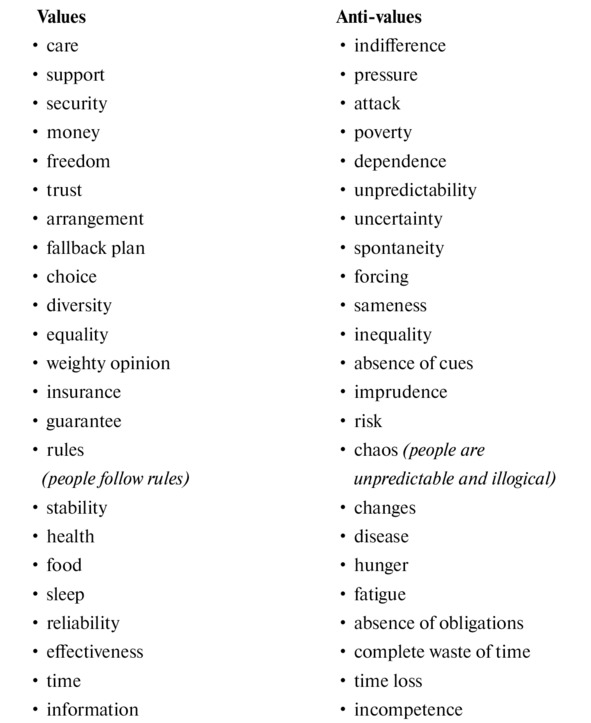

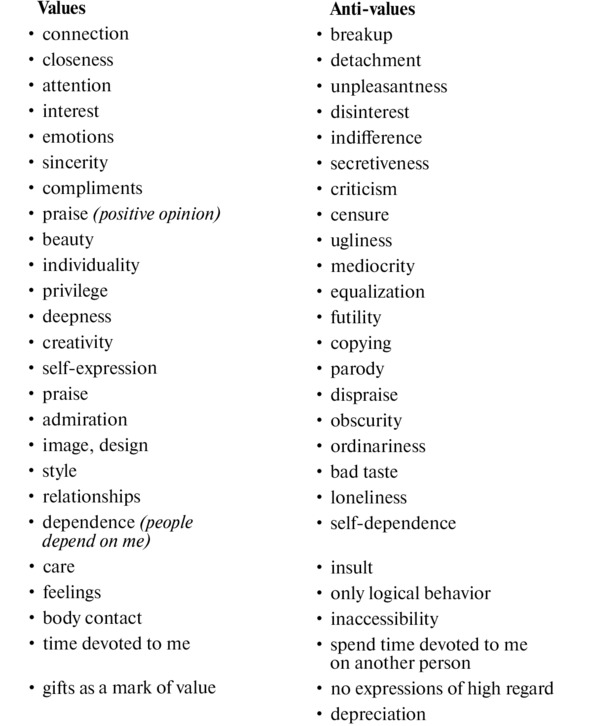
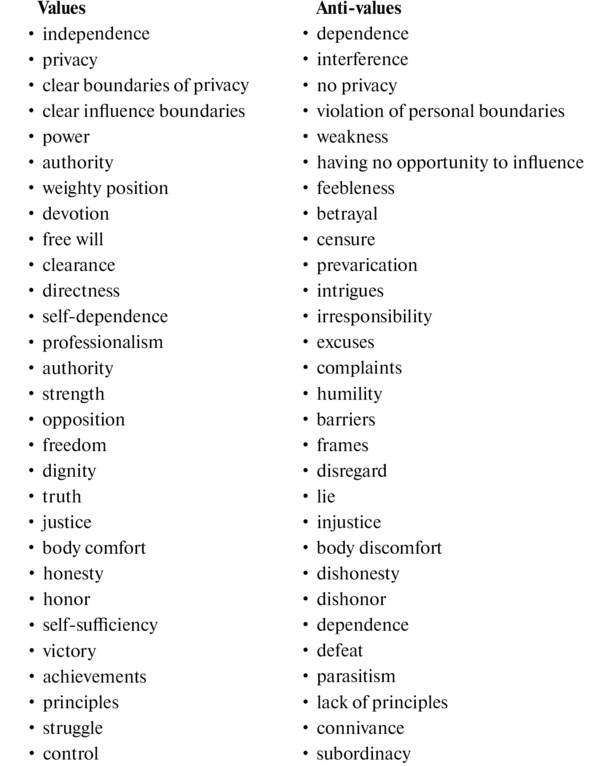
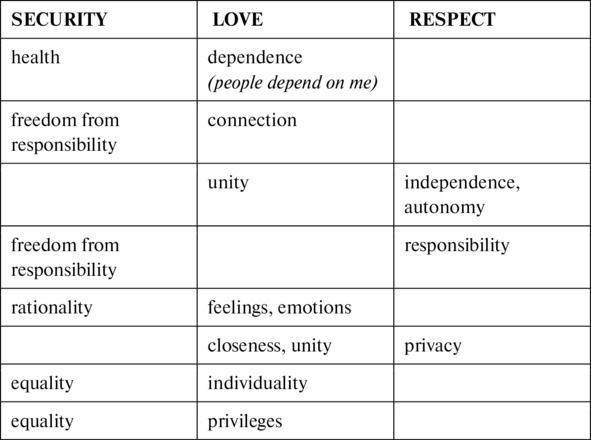
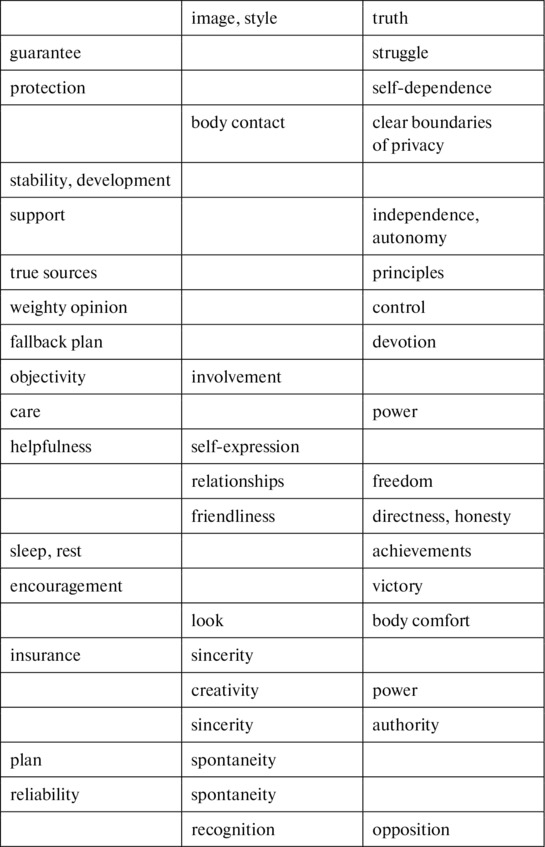

How to Define your Values?
Anything can be valuable to you if you have an emotional response to this (phenomenon, object, creature). If you have “skipped a beat” inside, then you have some relation to this phenomenon, action or event. You somehow distinguished it from others. So a connection has developed between you and something, “this” concerns you more than anything else.

